Sociology Essay: Ethical Implications of Voluntary Stopping Eating
VerifiedAdded on 2023/04/20
|7
|1444
|354
Essay
AI Summary
This essay examines the ethical implications of voluntary stopping of eating and drinking (VSED) by patients with life-limiting illnesses, addressing the question of whether it constitutes a form of suicide. It delves into the principles of healthcare ethics, particularly focusing on patient autonomy and the balance between respecting individual choice and ensuring well-being. The essay also considers the professional codes of ethics and conduct within the Australian healthcare system, referencing the Medical Board of Australia and the Nursing and Midwifery Board of Australia. It highlights the importance of ethical decision-making in healthcare, emphasizing the need to analyze issues and make informed choices that prioritize patient health and rights. Desklib provides students access to similar essays and study resources.
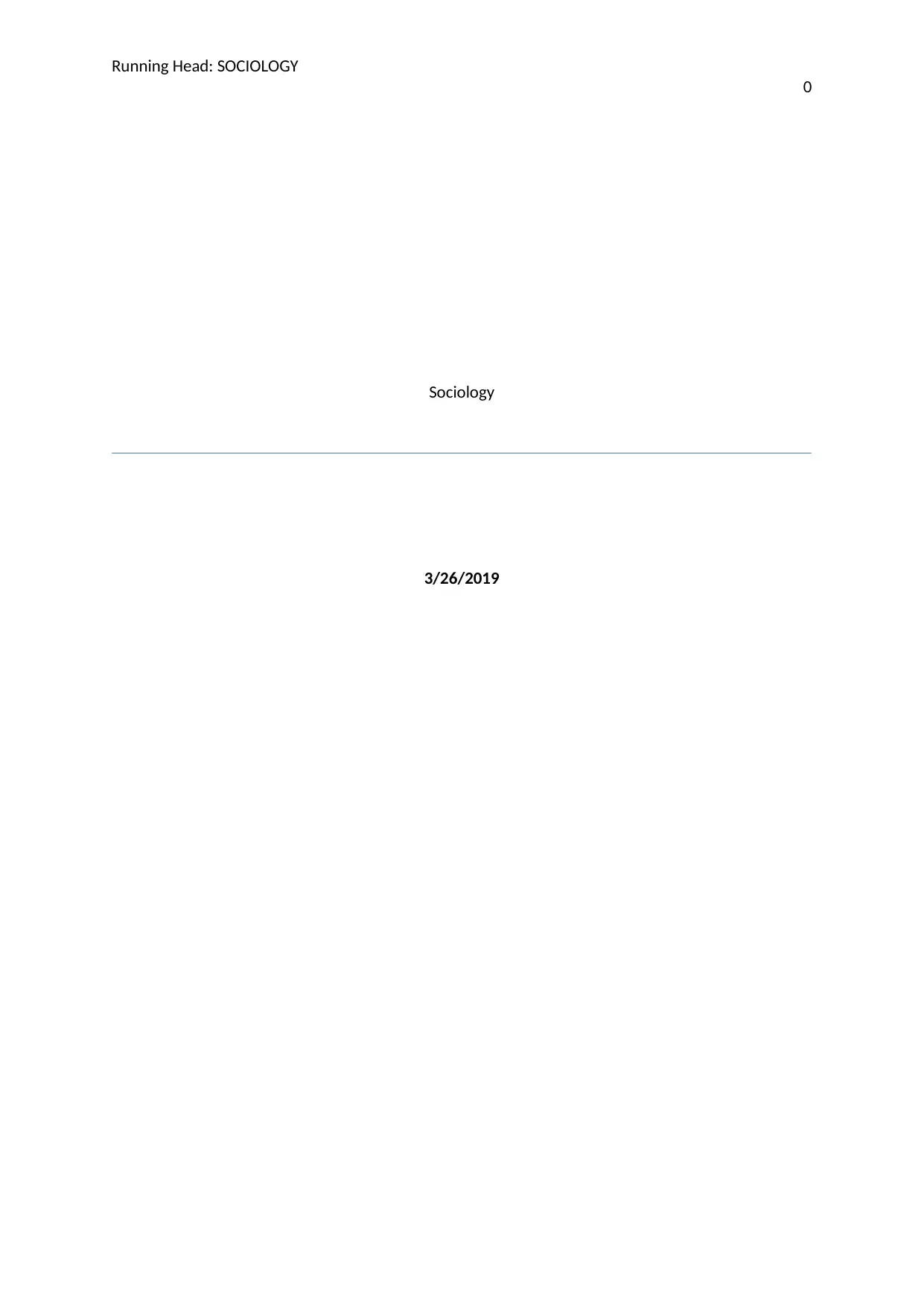
Running Head: SOCIOLOGY
0
Sociology
3/26/2019
0
Sociology
3/26/2019
Paraphrase This Document
Need a fresh take? Get an instant paraphrase of this document with our AI Paraphraser
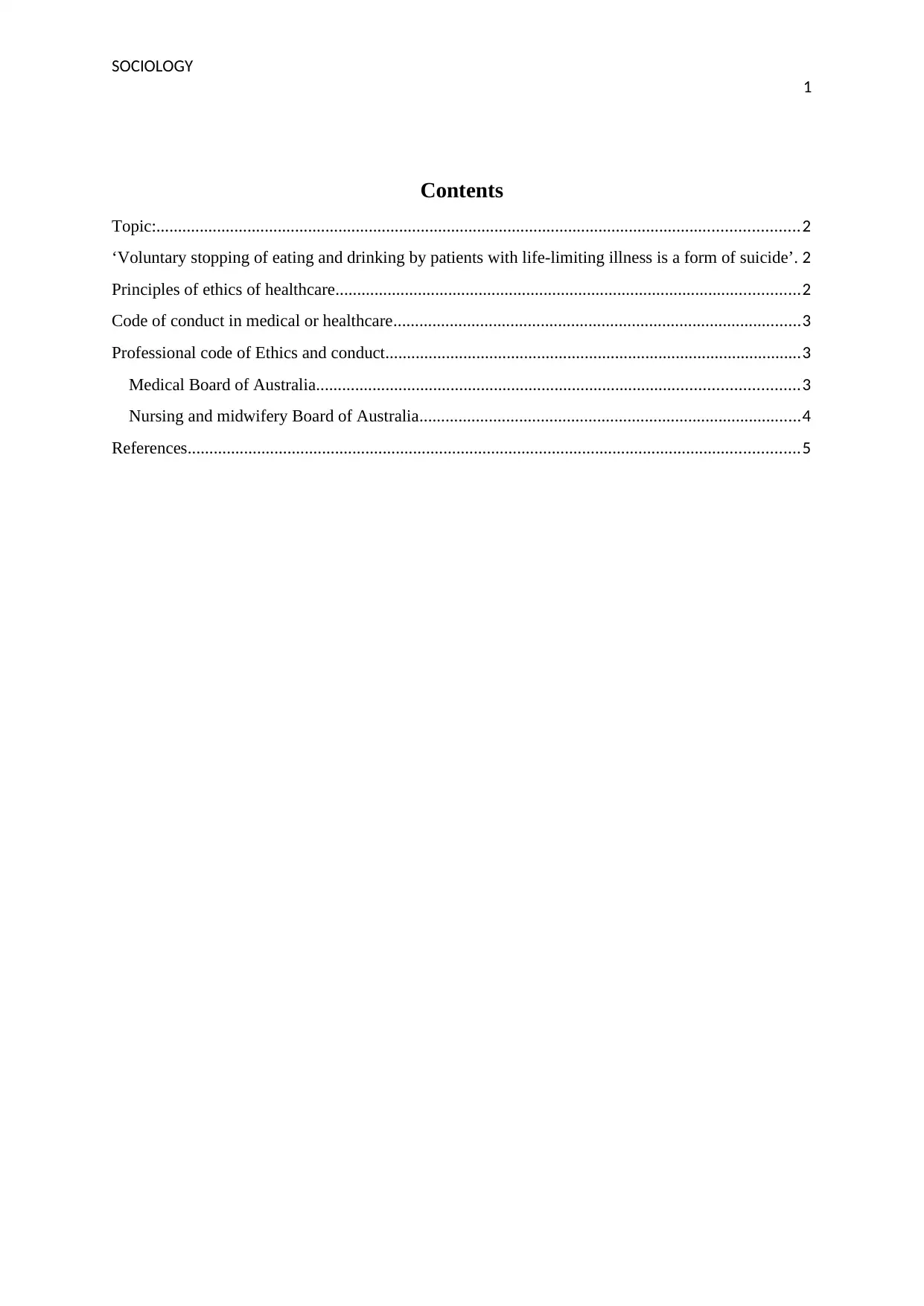
SOCIOLOGY
1
Contents
Topic:....................................................................................................................................................2
‘Voluntary stopping of eating and drinking by patients with life-limiting illness is a form of suicide’. 2
Principles of ethics of healthcare...........................................................................................................2
Code of conduct in medical or healthcare..............................................................................................3
Professional code of Ethics and conduct................................................................................................3
Medical Board of Australia...............................................................................................................3
Nursing and midwifery Board of Australia........................................................................................4
References.............................................................................................................................................5
1
Contents
Topic:....................................................................................................................................................2
‘Voluntary stopping of eating and drinking by patients with life-limiting illness is a form of suicide’. 2
Principles of ethics of healthcare...........................................................................................................2
Code of conduct in medical or healthcare..............................................................................................3
Professional code of Ethics and conduct................................................................................................3
Medical Board of Australia...............................................................................................................3
Nursing and midwifery Board of Australia........................................................................................4
References.............................................................................................................................................5
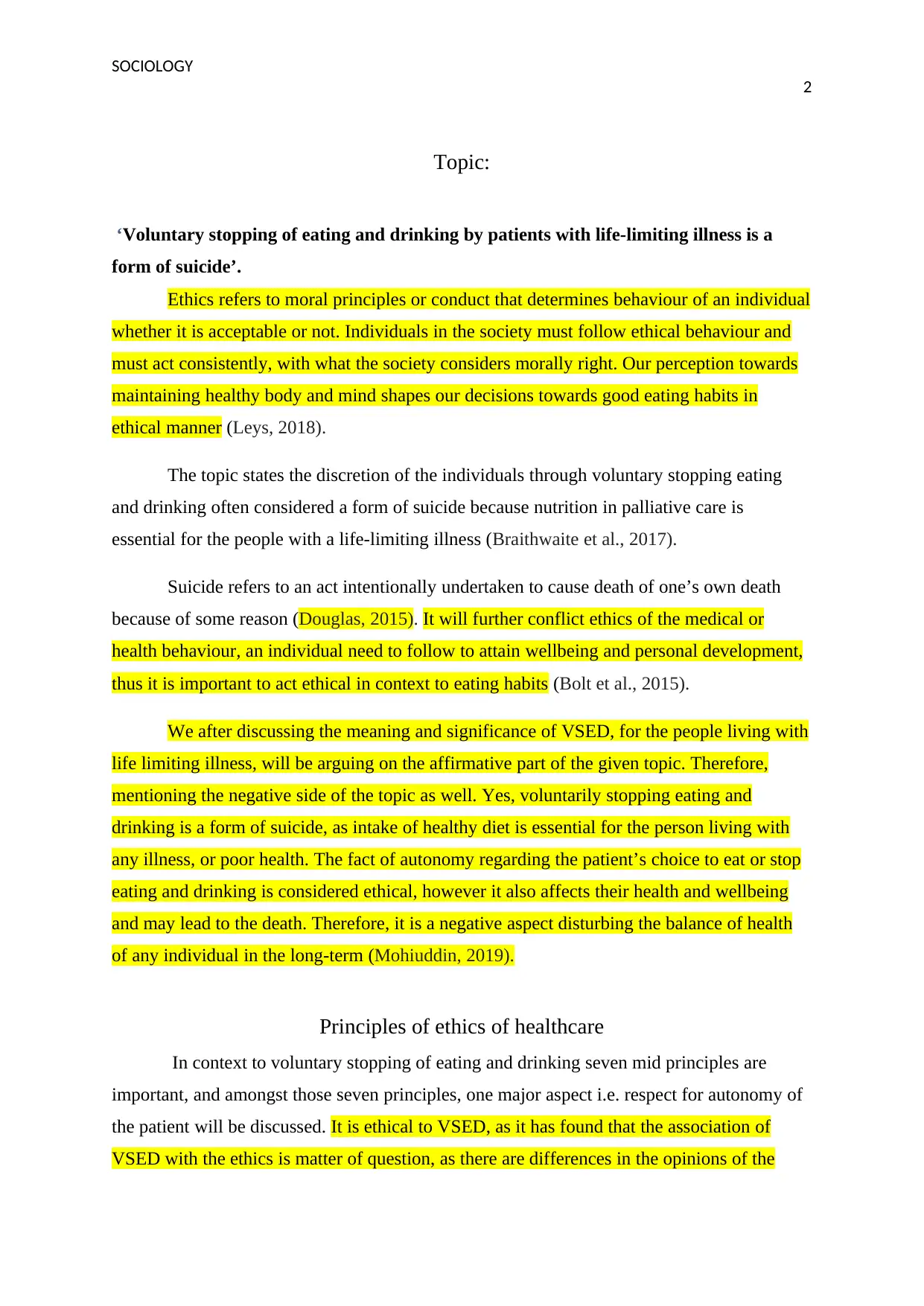
SOCIOLOGY
2
Topic:
‘Voluntary stopping of eating and drinking by patients with life-limiting illness is a
form of suicide’.
Ethics refers to moral principles or conduct that determines behaviour of an individual
whether it is acceptable or not. Individuals in the society must follow ethical behaviour and
must act consistently, with what the society considers morally right. Our perception towards
maintaining healthy body and mind shapes our decisions towards good eating habits in
ethical manner (Leys, 2018).
The topic states the discretion of the individuals through voluntary stopping eating
and drinking often considered a form of suicide because nutrition in palliative care is
essential for the people with a life-limiting illness (Braithwaite et al., 2017).
Suicide refers to an act intentionally undertaken to cause death of one’s own death
because of some reason (Douglas, 2015). It will further conflict ethics of the medical or
health behaviour, an individual need to follow to attain wellbeing and personal development,
thus it is important to act ethical in context to eating habits (Bolt et al., 2015).
We after discussing the meaning and significance of VSED, for the people living with
life limiting illness, will be arguing on the affirmative part of the given topic. Therefore,
mentioning the negative side of the topic as well. Yes, voluntarily stopping eating and
drinking is a form of suicide, as intake of healthy diet is essential for the person living with
any illness, or poor health. The fact of autonomy regarding the patient’s choice to eat or stop
eating and drinking is considered ethical, however it also affects their health and wellbeing
and may lead to the death. Therefore, it is a negative aspect disturbing the balance of health
of any individual in the long-term (Mohiuddin, 2019).
Principles of ethics of healthcare
In context to voluntary stopping of eating and drinking seven mid principles are
important, and amongst those seven principles, one major aspect i.e. respect for autonomy of
the patient will be discussed. It is ethical to VSED, as it has found that the association of
VSED with the ethics is matter of question, as there are differences in the opinions of the
2
Topic:
‘Voluntary stopping of eating and drinking by patients with life-limiting illness is a
form of suicide’.
Ethics refers to moral principles or conduct that determines behaviour of an individual
whether it is acceptable or not. Individuals in the society must follow ethical behaviour and
must act consistently, with what the society considers morally right. Our perception towards
maintaining healthy body and mind shapes our decisions towards good eating habits in
ethical manner (Leys, 2018).
The topic states the discretion of the individuals through voluntary stopping eating
and drinking often considered a form of suicide because nutrition in palliative care is
essential for the people with a life-limiting illness (Braithwaite et al., 2017).
Suicide refers to an act intentionally undertaken to cause death of one’s own death
because of some reason (Douglas, 2015). It will further conflict ethics of the medical or
health behaviour, an individual need to follow to attain wellbeing and personal development,
thus it is important to act ethical in context to eating habits (Bolt et al., 2015).
We after discussing the meaning and significance of VSED, for the people living with
life limiting illness, will be arguing on the affirmative part of the given topic. Therefore,
mentioning the negative side of the topic as well. Yes, voluntarily stopping eating and
drinking is a form of suicide, as intake of healthy diet is essential for the person living with
any illness, or poor health. The fact of autonomy regarding the patient’s choice to eat or stop
eating and drinking is considered ethical, however it also affects their health and wellbeing
and may lead to the death. Therefore, it is a negative aspect disturbing the balance of health
of any individual in the long-term (Mohiuddin, 2019).
Principles of ethics of healthcare
In context to voluntary stopping of eating and drinking seven mid principles are
important, and amongst those seven principles, one major aspect i.e. respect for autonomy of
the patient will be discussed. It is ethical to VSED, as it has found that the association of
VSED with the ethics is matter of question, as there are differences in the opinions of the
⊘ This is a preview!⊘
Do you want full access?
Subscribe today to unlock all pages.

Trusted by 1+ million students worldwide
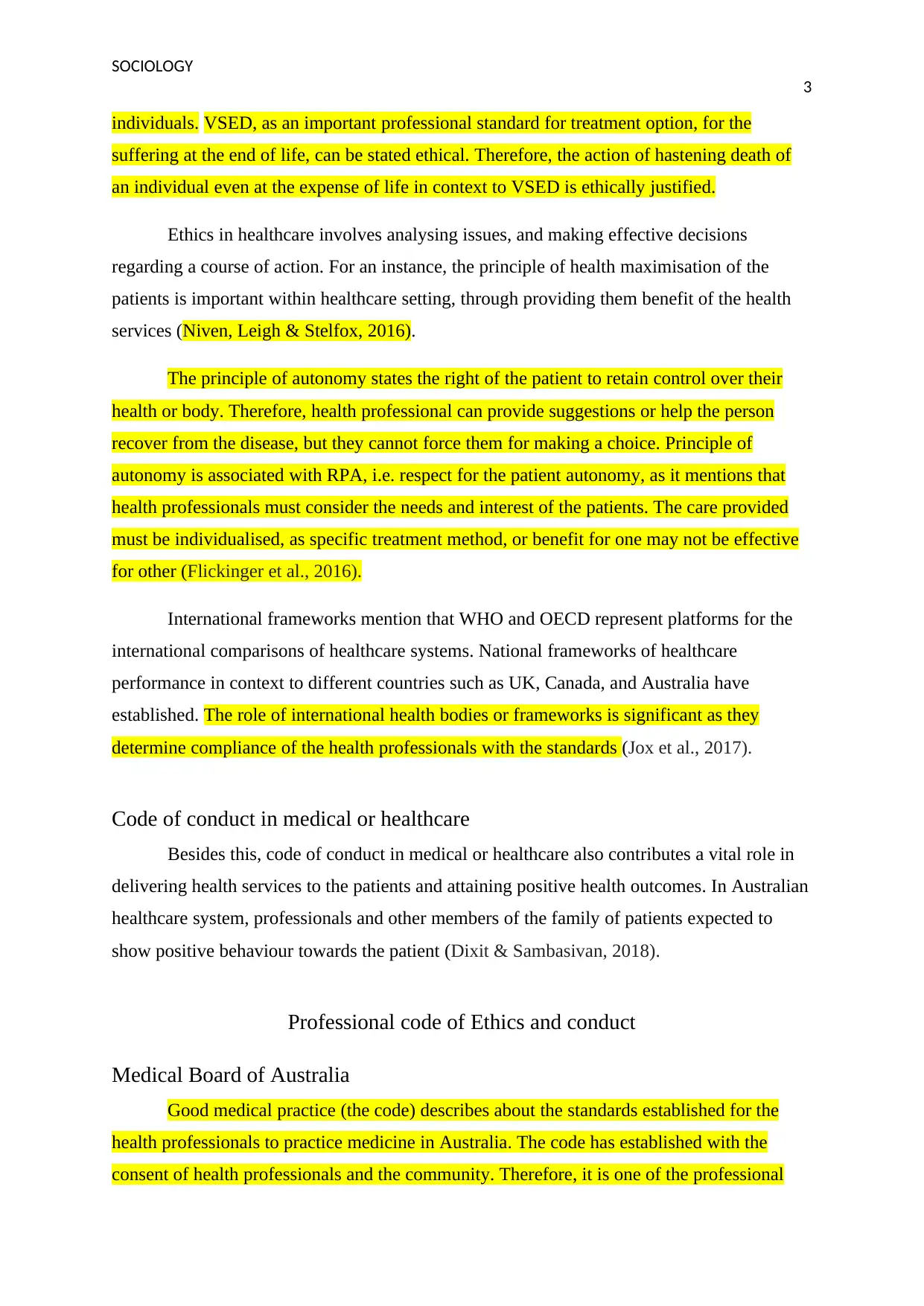
SOCIOLOGY
3
individuals. VSED, as an important professional standard for treatment option, for the
suffering at the end of life, can be stated ethical. Therefore, the action of hastening death of
an individual even at the expense of life in context to VSED is ethically justified.
Ethics in healthcare involves analysing issues, and making effective decisions
regarding a course of action. For an instance, the principle of health maximisation of the
patients is important within healthcare setting, through providing them benefit of the health
services (Niven, Leigh & Stelfox, 2016).
The principle of autonomy states the right of the patient to retain control over their
health or body. Therefore, health professional can provide suggestions or help the person
recover from the disease, but they cannot force them for making a choice. Principle of
autonomy is associated with RPA, i.e. respect for the patient autonomy, as it mentions that
health professionals must consider the needs and interest of the patients. The care provided
must be individualised, as specific treatment method, or benefit for one may not be effective
for other (Flickinger et al., 2016).
International frameworks mention that WHO and OECD represent platforms for the
international comparisons of healthcare systems. National frameworks of healthcare
performance in context to different countries such as UK, Canada, and Australia have
established. The role of international health bodies or frameworks is significant as they
determine compliance of the health professionals with the standards (Jox et al., 2017).
Code of conduct in medical or healthcare
Besides this, code of conduct in medical or healthcare also contributes a vital role in
delivering health services to the patients and attaining positive health outcomes. In Australian
healthcare system, professionals and other members of the family of patients expected to
show positive behaviour towards the patient (Dixit & Sambasivan, 2018).
Professional code of Ethics and conduct
Medical Board of Australia
Good medical practice (the code) describes about the standards established for the
health professionals to practice medicine in Australia. The code has established with the
consent of health professionals and the community. Therefore, it is one of the professional
3
individuals. VSED, as an important professional standard for treatment option, for the
suffering at the end of life, can be stated ethical. Therefore, the action of hastening death of
an individual even at the expense of life in context to VSED is ethically justified.
Ethics in healthcare involves analysing issues, and making effective decisions
regarding a course of action. For an instance, the principle of health maximisation of the
patients is important within healthcare setting, through providing them benefit of the health
services (Niven, Leigh & Stelfox, 2016).
The principle of autonomy states the right of the patient to retain control over their
health or body. Therefore, health professional can provide suggestions or help the person
recover from the disease, but they cannot force them for making a choice. Principle of
autonomy is associated with RPA, i.e. respect for the patient autonomy, as it mentions that
health professionals must consider the needs and interest of the patients. The care provided
must be individualised, as specific treatment method, or benefit for one may not be effective
for other (Flickinger et al., 2016).
International frameworks mention that WHO and OECD represent platforms for the
international comparisons of healthcare systems. National frameworks of healthcare
performance in context to different countries such as UK, Canada, and Australia have
established. The role of international health bodies or frameworks is significant as they
determine compliance of the health professionals with the standards (Jox et al., 2017).
Code of conduct in medical or healthcare
Besides this, code of conduct in medical or healthcare also contributes a vital role in
delivering health services to the patients and attaining positive health outcomes. In Australian
healthcare system, professionals and other members of the family of patients expected to
show positive behaviour towards the patient (Dixit & Sambasivan, 2018).
Professional code of Ethics and conduct
Medical Board of Australia
Good medical practice (the code) describes about the standards established for the
health professionals to practice medicine in Australia. The code has established with the
consent of health professionals and the community. Therefore, it is one of the professional
Paraphrase This Document
Need a fresh take? Get an instant paraphrase of this document with our AI Paraphraser
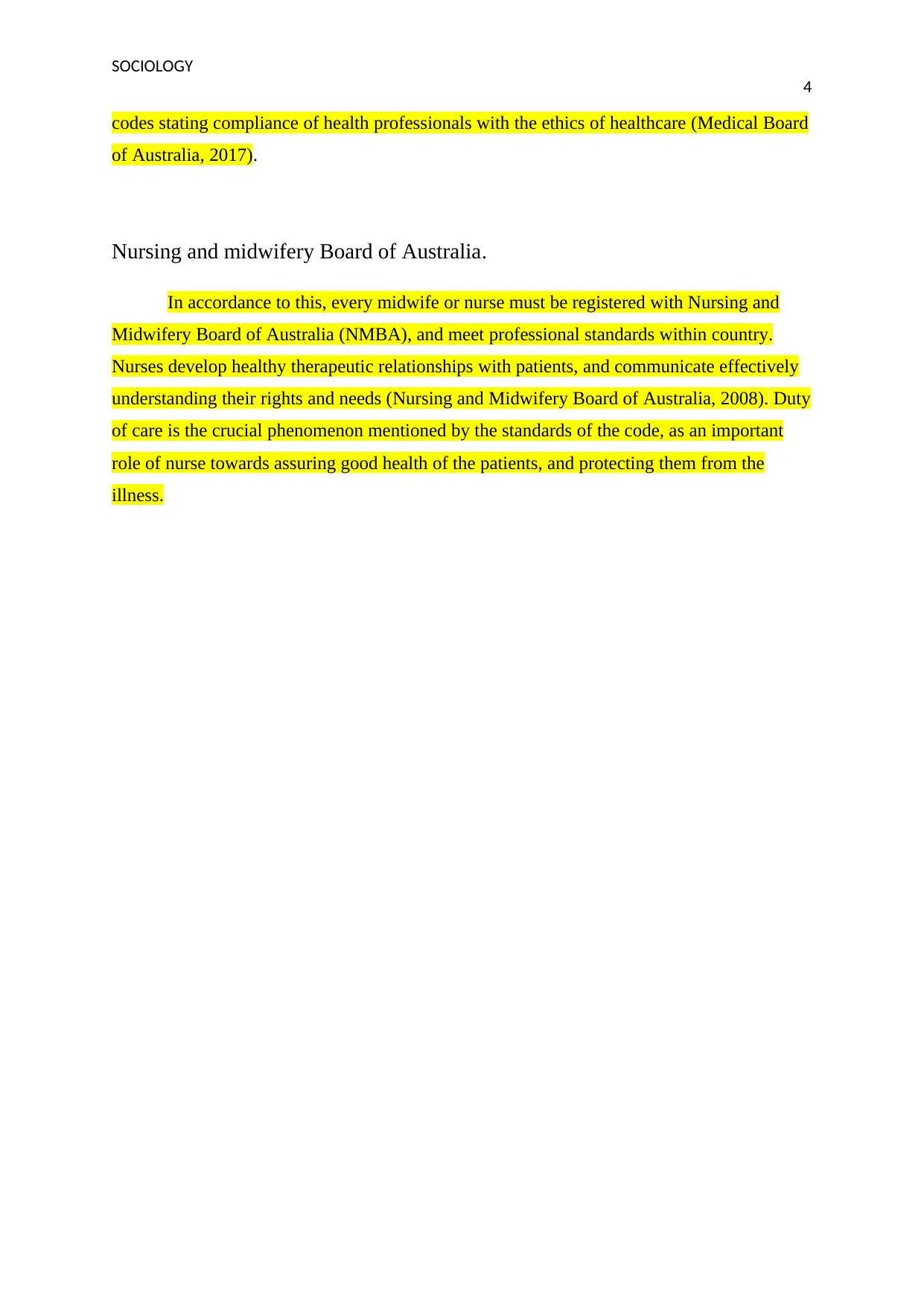
SOCIOLOGY
4
codes stating compliance of health professionals with the ethics of healthcare (Medical Board
of Australia, 2017).
Nursing and midwifery Board of Australia.
In accordance to this, every midwife or nurse must be registered with Nursing and
Midwifery Board of Australia (NMBA), and meet professional standards within country.
Nurses develop healthy therapeutic relationships with patients, and communicate effectively
understanding their rights and needs (Nursing and Midwifery Board of Australia, 2008). Duty
of care is the crucial phenomenon mentioned by the standards of the code, as an important
role of nurse towards assuring good health of the patients, and protecting them from the
illness.
4
codes stating compliance of health professionals with the ethics of healthcare (Medical Board
of Australia, 2017).
Nursing and midwifery Board of Australia.
In accordance to this, every midwife or nurse must be registered with Nursing and
Midwifery Board of Australia (NMBA), and meet professional standards within country.
Nurses develop healthy therapeutic relationships with patients, and communicate effectively
understanding their rights and needs (Nursing and Midwifery Board of Australia, 2008). Duty
of care is the crucial phenomenon mentioned by the standards of the code, as an important
role of nurse towards assuring good health of the patients, and protecting them from the
illness.
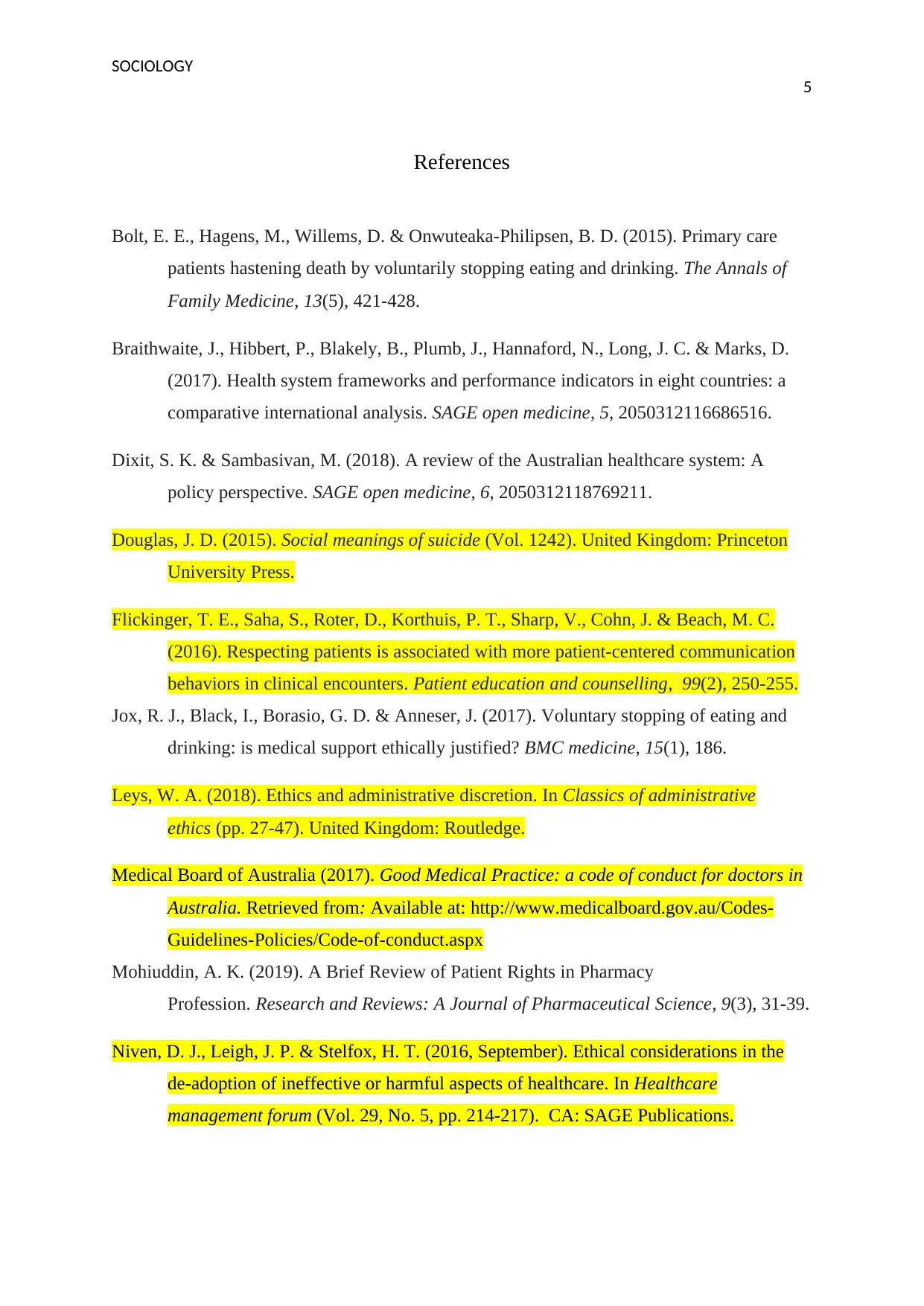
SOCIOLOGY
5
References
Bolt, E. E., Hagens, M., Willems, D. & Onwuteaka-Philipsen, B. D. (2015). Primary care
patients hastening death by voluntarily stopping eating and drinking. The Annals of
Family Medicine, 13(5), 421-428.
Braithwaite, J., Hibbert, P., Blakely, B., Plumb, J., Hannaford, N., Long, J. C. & Marks, D.
(2017). Health system frameworks and performance indicators in eight countries: a
comparative international analysis. SAGE open medicine, 5, 2050312116686516.
Dixit, S. K. & Sambasivan, M. (2018). A review of the Australian healthcare system: A
policy perspective. SAGE open medicine, 6, 2050312118769211.
Douglas, J. D. (2015). Social meanings of suicide (Vol. 1242). United Kingdom: Princeton
University Press.
Flickinger, T. E., Saha, S., Roter, D., Korthuis, P. T., Sharp, V., Cohn, J. & Beach, M. C.
(2016). Respecting patients is associated with more patient-centered communication
behaviors in clinical encounters. Patient education and counselling, 99(2), 250-255.
Jox, R. J., Black, I., Borasio, G. D. & Anneser, J. (2017). Voluntary stopping of eating and
drinking: is medical support ethically justified? BMC medicine, 15(1), 186.
Leys, W. A. (2018). Ethics and administrative discretion. In Classics of administrative
ethics (pp. 27-47). United Kingdom: Routledge.
Medical Board of Australia (2017). Good Medical Practice: a code of conduct for doctors in
Australia. Retrieved from: Available at: http://www.medicalboard.gov.au/Codes-
Guidelines-Policies/Code-of-conduct.aspx
Mohiuddin, A. K. (2019). A Brief Review of Patient Rights in Pharmacy
Profession. Research and Reviews: A Journal of Pharmaceutical Science, 9(3), 31-39.
Niven, D. J., Leigh, J. P. & Stelfox, H. T. (2016, September). Ethical considerations in the
de-adoption of ineffective or harmful aspects of healthcare. In Healthcare
management forum (Vol. 29, No. 5, pp. 214-217). CA: SAGE Publications.
5
References
Bolt, E. E., Hagens, M., Willems, D. & Onwuteaka-Philipsen, B. D. (2015). Primary care
patients hastening death by voluntarily stopping eating and drinking. The Annals of
Family Medicine, 13(5), 421-428.
Braithwaite, J., Hibbert, P., Blakely, B., Plumb, J., Hannaford, N., Long, J. C. & Marks, D.
(2017). Health system frameworks and performance indicators in eight countries: a
comparative international analysis. SAGE open medicine, 5, 2050312116686516.
Dixit, S. K. & Sambasivan, M. (2018). A review of the Australian healthcare system: A
policy perspective. SAGE open medicine, 6, 2050312118769211.
Douglas, J. D. (2015). Social meanings of suicide (Vol. 1242). United Kingdom: Princeton
University Press.
Flickinger, T. E., Saha, S., Roter, D., Korthuis, P. T., Sharp, V., Cohn, J. & Beach, M. C.
(2016). Respecting patients is associated with more patient-centered communication
behaviors in clinical encounters. Patient education and counselling, 99(2), 250-255.
Jox, R. J., Black, I., Borasio, G. D. & Anneser, J. (2017). Voluntary stopping of eating and
drinking: is medical support ethically justified? BMC medicine, 15(1), 186.
Leys, W. A. (2018). Ethics and administrative discretion. In Classics of administrative
ethics (pp. 27-47). United Kingdom: Routledge.
Medical Board of Australia (2017). Good Medical Practice: a code of conduct for doctors in
Australia. Retrieved from: Available at: http://www.medicalboard.gov.au/Codes-
Guidelines-Policies/Code-of-conduct.aspx
Mohiuddin, A. K. (2019). A Brief Review of Patient Rights in Pharmacy
Profession. Research and Reviews: A Journal of Pharmaceutical Science, 9(3), 31-39.
Niven, D. J., Leigh, J. P. & Stelfox, H. T. (2016, September). Ethical considerations in the
de-adoption of ineffective or harmful aspects of healthcare. In Healthcare
management forum (Vol. 29, No. 5, pp. 214-217). CA: SAGE Publications.
⊘ This is a preview!⊘
Do you want full access?
Subscribe today to unlock all pages.

Trusted by 1+ million students worldwide
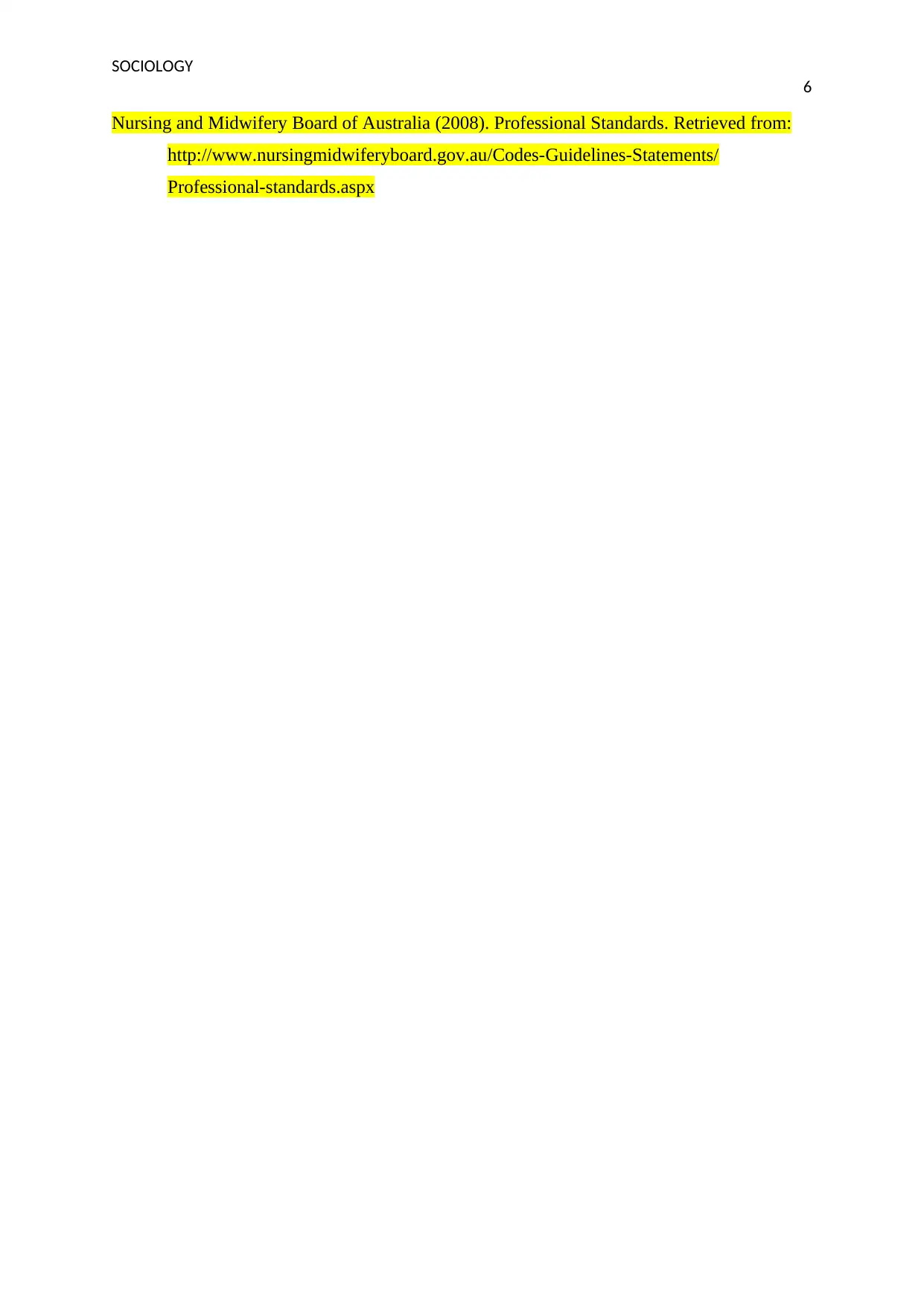
SOCIOLOGY
6
Nursing and Midwifery Board of Australia (2008). Professional Standards. Retrieved from:
http://www.nursingmidwiferyboard.gov.au/Codes-Guidelines-Statements/
Professional-standards.aspx
6
Nursing and Midwifery Board of Australia (2008). Professional Standards. Retrieved from:
http://www.nursingmidwiferyboard.gov.au/Codes-Guidelines-Statements/
Professional-standards.aspx
1 out of 7
Related Documents
Your All-in-One AI-Powered Toolkit for Academic Success.
+13062052269
info@desklib.com
Available 24*7 on WhatsApp / Email
![[object Object]](/_next/static/media/star-bottom.7253800d.svg)
Unlock your academic potential
Copyright © 2020–2026 A2Z Services. All Rights Reserved. Developed and managed by ZUCOL.





